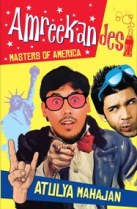The FOB who became an ABCD
She was a starry eyed fresh off the boat when she landed at the Seattle airport and was driven to her host family by one of the members of the Indian Students’ Association who helped jetlagged, confused, and unsettled FOBs like her settle down the first time they landed in America. Her host family was a respectable and God fearing South Indian couple who had promised to help her with her homelessness for the first few days.

Expecting a Kanjivaram-clad hostess with the welcome thali of flowers and sweets was perhaps too much, but nothing had prepared her for the shortness of the shorts she found her hostess wearing. She had literally gaped at her bare legs in horror, feeling like a true fresh off the boat bullock cart from the nearby village. Her house had seemed like a mansion, and that had thankfully taken her attention off her legs.
It did not seem like some 30 hours since she had labeled her name on the newly acquired American Tourister suitcases, checked her flight timing for the eighteenth time to avoid any am versus pm confusion, touched her grandparents’ feet, promised her parents she will never marry a “foreigner”, loaded the rental Tata Sumo with the suitcases while the neighbors from every balcony watched with interest, and had left for the airport. Little did she know that she would not use most things in her suitcases. She never touched the brick-heavy Biotechnology textbook she had painstakingly packed.
In six months, she outgrew most of the clothes she had shopped for, thanks to the land of milk and honey (and cheese, canned food, and Nutella) that America was. The rest of the clothes (including the formal shirt and trousers tailored at the biggest Raymond’s showroom in Calcutta) soon seemed out of fashion compared to American styles. Two weeks into the program, and she had befriended a couple of Jims, Evas, and Emilys. She was spending her weekends hiking, rock climbing, attending barbeque and beer parties, and laughing at American jokes she did not understand. She was clearly trying to fit into America.
Her acclimatization experience did not come without some ten dozen embarrassing experiences when she made a fool of herself. But she learned well. She learned that light switches worked differently, bathrooms were restrooms, baths were showers, notes were bills, bills were checks, and checks were also checks. She learned to run hot water without burning herself. She learned not to use the word dicky for car trunks, and learned that a fast food chain was called Dick’s. She learned that it was actually okay to ask for boxes for leftover food, and capsicums, brinjals, and lady’s finger had their own names here.
She learned to drop the words sir and madam, and address her professor, as old as her grandfather, using his first name. She learned to acquire cheap junk from Walmart and garage sales. She learned that it is actually possible to score a 90 in an exam and still be counted as below average. She learned that FOBs and ABCDs are as different as chalk and cheese. She learned the irony of American courtesy, where every stranger you passed by would nod and smile, yet there was much hype about space and privacy.
Her steep learning curve was not without many embarrassing experiences. The first time a stranger on the street had smiled and said, “How are you doing?”, she had stopped and asked him, “Do I know you?” She had asked a single mother where her husband worked. She had ordered que-sa-dilla, fa-jita, and tor-tilla at restaurants, enunciating it exactly the way it is spelled. She had called guacamole avocado paste at Chipotle, and had piled up huge blobs of white cheese on her plate, mistaking it to be pastries at the departmental lunch.
She had dreaded dinner parties consisting of green leafy veggies fit for ruminants, turkey sandwiches, bland pizzas, chips, egg dipped cookies, cut fruits, and coke, terribly missing the daal chawal from home. Slowly, this became a way of life. She accepted that she would always be asked if India was still the land of elephants, belly dancers, and snake charmers. She learned that she will always be that brown girl with a Rajesh Koothrapalli-like English accent. Most importantly, she learned that no matter how much she tried to fit in, she would never be one of them. The alienating experience did not come from people. The alienating feeling came from within her. She soon got tired of dressing up for Halloween, going for the happy hour at an insanely loud local pub on a Thursday night, or laughing at jokes where she did not get the reference at all.
Sick with nostalgia after the initial excitement of America had faded, she then recreated her India away from India. She started hanging out predominantly with her Indian friends, trading Halloween costume parties for traditional Indian events, almost celebrating every Indian festival from Sankrantis and Shiv Ratris, and learning more about Indian culture than she had ever done during her 25 year long stay in India.
Every little thing associated with India made her nostalgic, be it the sight of frozen hilsa fish or the chubby Bengali couple at the Indian grocery store, the Satyajit Ray movie nights, or meeting a flock of NRI Bengalis at the Durga Puja who mainly talked about green cards, material affluence, sarees and jewelry. She had transformed from being an Indian in India to an FOB in America, and then to a tearfully-nostalgic Indian in America who wept while watching partition movies or listening to the national anthem. However, life hadn’t come full circle yet.
She was intelligent enough to figure out that no matter how she loved the freedom and the opportunities life in America provided, she would never be one of them. She was not eligible for certain scholarships or government jobs because she was not a citizen. If the economy got any worse and companies were downsizing, she would be the first one to be fired. If she did not make it to the H1B lottery, she would have to leave the country. Her existence in America after graduating from school depended on a string of factors she had no control over. She was light years away from bargaining for a secure life. America was slowly losing its charm.
Life came to a full circle during her maiden visit to India. She was gone for four years, only to come back to a different country. Random aunties dropped in for evening tea and free snacks to ask her questions invading her privacy. People laughed at her when she used words like space and privacy. They asked her why she was not getting married. Many showed surprise that she still remembered Bengali.
They asked her unsettling questions, like if she was going to settle in America. They asked her what she eats, what she wears, and how much she earns. They came home and checked her out as if she was a gorilla in the zoo. They told her not so euphemistically that she had become fat. They asked her when she would take her parents to visit America. They laughed at her when she tried fastening the seat belt. They mocked her when she looked for a trash can dustbin to throw trash. They asked her quizzically why she was not drinking mineral water. They asked her if Indian boys and girls really lived together before marriage in the US. They assumed people lived on burgers and fries, and drank beer all day.
Her greatest shock came during her outdoor visits. The cheapest coffee at a coffee store cost more than hundred rupees. Ordinary looking clothes at Pantaloons and Westside cost her monthly salary back from 2006. People swore by KFC, Subway, Sephora, and United Colors of Benetton. People no longer hung out at College Street or Victoria Memorial, the “mall culture” had caught on as a fever. An ordinary looking dress at an upscale shop that barely impressed her had a price tag of three thousand rupees. Bengalis paid a fortune to eat authentic Bengali food that our mothers and grandmothers have always cooked gratis at home. Ever dreamt of spending a thousand rupees eating Mocha’r Ghonto and Shukto? People looked at her in disbelief when she told them she has never been to a KFC, neither in the US, nor in India. She wondered what was the craze about eating at “Mac Dee’s”, a fast food joint fit for nothing better than a last resort during road trips.

“What were you expecting Kolkata to be? Some village? We are doing equally well as you are, even better”.
It took her a while to figure out who was “we” and who was “you” here. Clearly, she had become “you people” and the rest were “we people”. America hadn’t alienated her as much as India had. If she felt like a dehati in America, she felt like a dehati on steroids in India. People subjected her to harsh scrutiny every time she did things a certain way. She was having dinner with a close friend one evening when the waiter asked her if she needed more water. “I am good”, she said instead of a no, thank you, more out of habit than out of the need to show off her Americanism. The waiter looked confused wondering how “I am good” had anything to do with wanting or not wanting more water. Her friend got extremely upset about this, accusing her of showing off. When she wore traditional Indian clothes in India, her tank-top wearing friends remarked with sarcasm that she was so western that she only wore Indian clothes to show off.
She imagined she was standing in the middle of the streets of Seattle, trying to blend in with the people around her, when they turned to her and said, “You can never be one of us”. The next moment, she was standing in a crowded street in Kolkata, trying to fit in after all these years, and her own people turned to her and said, “You are not one of us anymore”. In more ironic ways than one, she was a foreigner in America, and now she had become a foreigner in India. In less than five years, she had transformed from being an FOB in America to an ABCD in India.
An Alienated & Badgered Confused Desi.
[The author is a doctoral student at the University of Virginia. Her interests other than educational research and designing studies include writing, photography, and globetrotting. She is known as DC.]
[If you would like to contribute an article, read this for details.]





Very Nice Read. Everyone feels so differently going to a place, making it home and returning back to the original place. I never want people back home introduce me as NRI but they can’t help themselves, they still do at the first instance and the whole conversation gets going around me which I dread. However, best you try to fit back in India as if you had never left, there are occasions when people remind it that you are not a pakka local Desi Indian any more. But away from these fitting in feelings, mind still yearn to live where one is not like one thinks of constantly spending time in India if one is still abroad and if one is in India, it will be other way round as one will start missing the things they can no longer have in India and the places they can never be any more. Aah what a life - one always love to miss something rather than enjoy whatever is in front.
My god, you’re a whiny loser! :D
This is absolutely true and I have experienced quite a few of them ever since my return from US a year and a half ago.
I feel for you, miss! I’m a sort of “ABCD” with a totally mixed up background and a set of experiences most people can’t relate to, and I feel like a stranger when I’m with either Americans or Desis. You’re part of a subculture as am I, we just have to find more ppl like us to feel part of “a group” again.
Awesome article DC ! I have shared this article on my FB page and my Americans actually understand when I say … Dicky or “Aluminum” …. Cheers mate
Thanks to share your experience with us, so you can re-examine their own personal bias and thinking habits. Great stuff, toogood to be true!
Truly a nice read! Made me nostalgic for quite sometime, as I remembered my experiences.
Good read! But, I can not totally agree with the ‘becoming ABCD’ part! Once you have been in a place for the first 20 odd years of your life it is really difficult to be ABCD unless you put in real good effort. When offered something you don’t need…by default, ‘no, thanks’ would be the reaction…staying in the US will not replace that with ‘I am good’ unless you really are trying hard to Americanise yourself.
Many of us Indians speak good English, albeit different from American English. So why give up on that? I would speak slowly or repeat myself (if need be) but will not Americanise my good old English. I have been saying ‘no, thanks’ in America for the past so many years; that’s the response I am used to and that’s not rude or bad. Whenever someone American tells me, ‘You speak good English’…I politely reply, ‘Thanks! Even you speak pretty good English’.